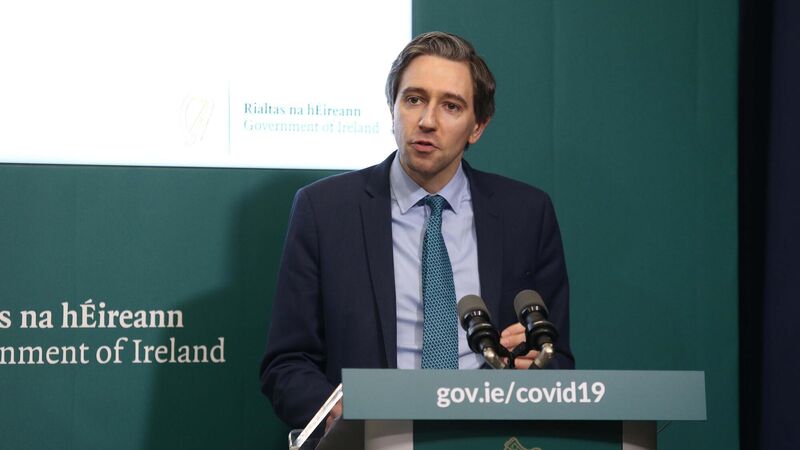'Government doesn't care if you went for the banoffee': Harris admits lack of clarity around new law

Simon Harris said that the new law was a temporary measure to enable the provisions that were already in place to be enforced
Minister for Further and Higher Education Simon Harris has acknowledged that there was a lack of clarity in relation to the new law requiring restaurants and pubs serving food to record all individual orders and to keep the information for 28 days.
The Restaurants Association of Ireland is among representative bodies expressing concern at the new requirement, claiming it came out of the blue and has heaped an extra burden on its under-pressure members.
On Wednesday, the Vintners’ Federation of Ireland (VFI) described it as “bureaucracy gone mad”.
The Irish Council for Civil Liberties says the level of detail required amounts to policing surveillance.
Speaking on Newstalk Breakfast Mr Harris said the records of peoples' meals would be kept through receipts, and that it was important that such measures were communicated with stakeholders.
The Minister was critical of the rhetoric of some politicians.
“The use of loaded language has definitely gone too far, we've seen bizarre terms with peculiar historical connotations - I think people in the Oireachtas need to mind their language.
"I think there's been a lack of clarity in relation to this.
“The Government doesn't care if you had a cup of coffee or a desert or whether you went for the banoffee - or as one publican asked me last night if you went for the garlic sauce or the pepper sauce.
“I want to get back to a situation where we can move back to where we need to move back to, where we try to work out a way of living alongside the virus, where we actually get more businesses back open.
"Where we do get our pubs open. The Government is working on a new national plan to live alongside this virus for the next few months.”
The Minister said that the new law was a temporary measure to enable the provisions that were already in place to be enforced, “but I do think it's important that our state agencies communicate with the stakeholders”.
Mr Harris said he agreed with Tánaiste Leo Varadkar “we should find a way to open pubs.
"I fully agree with Leo on this - we obviously have to do it in a safe way with very strict restrictions and at a time that was right.
“When you look across the EU now there are many countries that are seeing a lower prevalence of the virus who are managing to open pubs.”
Mr Harris said he was getting worried about the wellbeing of people.
“We need to get to a point where we trust each other, trust businesses, trust people and individual responsibility along with the State continuing to do its part with testing and tracing as well.”
Labour leader Alan Kelly has called on the data commissioner to closely examine the new law.
It was “completely and utterly bonkers” he told RTÉ radio’s Morning Ireland and he said he worried that the Cabinet had signed off on the new rule.
The Government needs to keep the public onboard, this was “a step too far”.
It was nonsensical he said to have to keep records for 28 days.
“When did eating food become linked to public health measures?” he asked.
The new law was just “too draconian”, he said. There were enough measures already in place to deal with publicans breaking regulations.
Mr Kelly said that the Government had “gone off reservation” and had gone too far and they were going to face public backlash.
Earlier on Morning Ireland, Adrian Cummins, chief executive of the Restaurants Association of Ireland (RAI) said that the nub of the issue was how the new measure had been communicated to the industry and the lack of consultation.
“This should have been communicated after the Cabinet meeting on Tuesday when it was signed off.
"There was no announcement on August 18 around the new regulations for six at a table, hand sanitisers. This came out of the blue.”
Mr Cummins said that restaurant owners want to adhere to public health advice in the best interest of Ireland, but there was a lot of fear in the sector and the new law was a further regulatory burden.
There needed to be further clarification whether the record needs to show that a person had a meal or if a table had meals with alcoholic drinks, he said.
Minister of State at the Department of Business Enterprise and Innovation Damien English has said that the new law was not about what a person ate, it was proof that they did eat.
Mr English told RTÉ television’s Prime Time that the measure was to enable public health teams as well as the gardaí to monitor compliance with Covid regulations.
He acknowledged that the new rules would mean “more hassle” and “more paperwork”.
“There's two reasons here, one the advice is that they record the time people entered, who they are and a contact number.
"In addition to that now you have to also keep proof of purchase of food and that's for two reasons because the regulations say there has to be purchase of food.
“This is to enable the health authorities, public health teams as well as the gardaí to monitor compliance with the regulations.
"The regulations are there to protect all of us, but also to reopen business.
“I accept it's more hassle, it's more paperwork. It's difficult as it is, but it if helps us reopen the pubs that's what we have to do.”
The new regulation was there to protect people, said the Minister, to help reopen businesses and to “ensure a level playing field.”
Most businesses would record this information anyway, he added.





